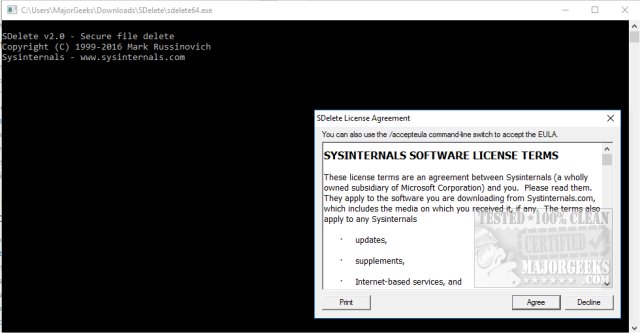SDelete is a command-line utility that allows you to delete one or more files or directories or cleanse free space on your hard drive. SDelete GUI also available.
SDelete is a command-line utility that allows you to delete one or more files or directories or cleanse free space on your hard drive. SDelete GUI is also available.
One feature of Windows C2-compliance is that it implements object reuse protection. This means that when an application allocates file space or virtual memory, it cannot view data previously stored in the resources Windows allocates for it.
Windows NT zero-fills memory and zeroes the disk sectors where a file is placed before presenting either type of resource to an application. However, object reuse does not dictate that a file occupies a file before it is deleted be zeroed. This is because Windows NT/2K is designed to assume that the operating system controls system resource access. However, when the operating system is not active, it is possible to use raw disk editors and recovery tools to view and recover data that the operating system has deallocated. Even when you encrypt files with Windows Encrypting File System (EFS), a file's original unencrypted file data is left on the disk after a new encrypted version of the file is created.
The only way to ensure that deleted files and files you encrypt with EFS are safe from recovery is to use a secure delete application. Secure delete applications overwrite a deleted file's on-disk data using techniques shown to make disk data unrecoverable, even using recovery technology to read patterns in magnetic media that reveal weakly deleted files. SDelete (Secure Delete) is such an application. You can use SDelete both to delete existing files securely, as well as to securely erase any file data that exists in the unallocated portions of a disk (including files that you have already deleted or encrypted). SDelete implements the Department of Defense clearing and sanitizing standard DOD 5220.22-M to give you confidence that once deleted with SDelete, your file data is gone forever. Note that SDelete securely deletes file data, but not file names located in free disk space.
SDelete uses Microsoft PowerShell.
Similar:
How to Add 'Secure Delete' to the Windows 10, 8 and 7 Context Menu
How to Securely Delete Files in Windows 10 With PowerShell and Cipher
Quick Format and Full Format Explained
How to Erase a Disk Using Diskpart Clean Command in Windows
Download


